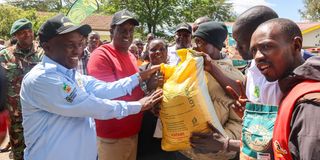Premium
State releases 7.5 million bags of fertiliser ahead of planting

Agriculture PS Paul Kipronoh Rono (left) and Narok Governor Patrick ole Ntutu (centre) handing over a sack of seeds to a farmer after they flagged of part of the consignment of 7.4 million bags of subsidised fertilisers and seeds for national distribution at the National Cereals and Produce Board in Narok on December 18, 2024
The government has announced the release of 7.5 million bags of subsidised fertiliser in preparation for the January 2025 planting season. Distribution will be carried out not only through National Cereals and Produce Board (NCPB) depots but also via certified agrovet outlets.
Agriculture Principal Secretary Dr Paul Ronoh said the distribution targets agriculturally productive counties such as Narok, Bomet, Kericho, Trans Nzoia, Uasin Gishu, Bungoma, Kisii, Nyamira, Nakuru, Nandi, and Elgeyo Marakwet.
According to Dr Ronoh, collaboration between the national and county governments has been instrumental in scaling up the programme over the past two years, ensuring more farmers benefit from subsidised inputs. Previously, a 50-kilogram bag of fertiliser retailed for around Sh6,500. Under President William Ruto’s administration, the subsidy programme has reduced the price to Sh2,500 per bag, significantly easing the financial burden on farmers.
The initiative also extends to 680,000 small-scale tea growers through the Kenya Tea Development Agency (KTDA), aiming to enhance tea production for both local consumption and export markets. However, some farmers have called for the reopening of registration for beneficiaries, noting that many were excluded from the initial process.
Dr Ronoh stated that the subsidy programme has helped stabilise food prices by boosting local production, which has led to a significant drop in food imports over the past two years.
Speaking during fertiliser distribution launches in Bomet and Narok counties, alongside Governors Patrick Ole Ntutu (Narok) and Prof Hillary Barchok (Bomet), Dr Ronoh reiterated the government’s commitment to working with stakeholders to improve farmers’ access to inputs.
In response to farmers’ grievances, the government has also temporarily suspended wheat imports until locally produced stock is depleted. Currently, 125,000 bags of wheat remain unsold at NCPB depots, creating financial challenges for farmers. Dr Ronoh stated that the Agriculture and Food Authority (AFA) would regulate cereal imports to prioritise the sale of local produce.
“The AFA will ensure millers adhere to government regulations, requiring them to purchase a specific percentage of local produce before receiving import permits,” he said.
Kenya produced 310 metric tonnes of wheat in 2023, with Narok County contributing 168 metric tonnes, making it the country’s largest wheat-producing region.
The government is also addressing challenges in potato farming, particularly the enforcement of 50-kilogram me packaging to curb exploitation by middlemen.





